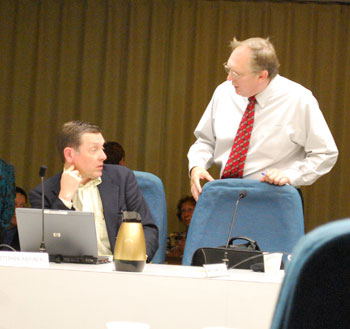Ann Arbor City Council meeting (Sept 7, 2010): The council handled its relatively light agenda without taking a recess, taking a little over two hours to finish its Tuesday-after-Labor-Day business.

Before the meeting, Stephen Rapundalo (Ward 2), who's seated in his usual spot at the council table, chats with city attorney Stephen Postema. During Tuesday's meeting, Rapundalo and Postema insisted that there had been no directive given to the city attorney regarding a medical marijuana moratorium – despite the fact that previously both men used forms of the word "directive" to explain the attorney's actions. (Photo by the writer.)
An item that could have prompted extended deliberations – the so-called “porch couch ban” – was instead postponed until the council’s next regular meeting on Sept. 20. At the start of the meeting, the council heard a staff presentation on the fire hazards posed by porch couches and their negative visual impact.
Mayor John Hieftje and the sponsor of the measure, Christopher Taylor (Ward 3), indicated early in the evening that a postponement of the couch ban was likely, but several people still addressed the council during a public hearing on the issue. The public hearing will be continued until Sept. 20, when the council is likely to take a final vote on the matter.
Among the business the council did vote on at Tuesday’s meeting was a tax abatement for NanoBio worth around $30,000 over the next five years. The biotech company is a University of Michigan spin-out, which has developed nano-technology platforms in the area of topical antibiotics and nasal sprays. The abatement is on NanoBio’s investment of roughly $200,000 in building improvements and $483,000 in equipment purchases for its Green Road facility.
Also affecting the Green Road neighborhood was an application to the Michigan Dept. of Transportation for Thurston Elementary School’s Safe Routes to School program, which the council authorized. The grant from MDOT, worth $157,555, would pay for infrastructure improvements – like pedestrian islands on Green Road. The grant would cover all of the construction costs, with the design and contingency costs of $30,000 to be drawn from the city’s alternative transportation fund, which ultimately comes from the state through Act 51 [gas tax] monies.
The city’s alternative transportation fund was lurking in the background on Tuesday night in an additional way. A public hearing took place on the special tax to be assessed on property owners whose land abuts a proposed non-motorized path along Washtenaw Avenue between Tuomy and Glenwood roads. The project is to be funded from $826,727 out of the alternative transportation fund, $694,039 from an MDOT grant, with a special assessment on property owners paying for the remaining $59,234. Several of the property owners addressed the city council Tuesday night to object to the assessment, which will cost them around $3,500 each.
In addition to the meeting’s usual range of communications and announcements, Stephen Rapundalo (Ward 2) attempted to clarify some comments he’d made at the council’s Aug. 5 meeting about a closed session that council had conducted on July 19 regarding a medical marijuana moratorium. The Chronicle will report on those comments – and the council’s possible Open Meetings Act violation – in a separate opinion piece. [Full Story]




